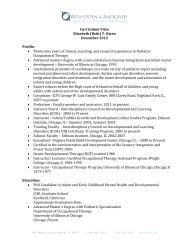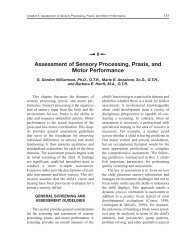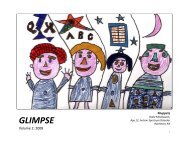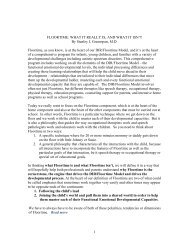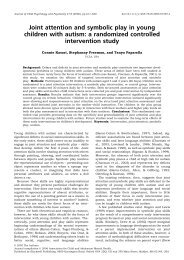Minding the Baby: A Reflective Parenting Program - Interdisciplinary ...
Minding the Baby: A Reflective Parenting Program - Interdisciplinary ...
Minding the Baby: A Reflective Parenting Program - Interdisciplinary ...
You also want an ePaper? Increase the reach of your titles
YUMPU automatically turns print PDFs into web optimized ePapers that Google loves.
eflective capacities are challenged and even diminished.<br />
In <strong>the</strong> following sections, we will describe our work with Mia, Iliana, and <strong>the</strong>ir babies. In some ways, <strong>the</strong>irs are<br />
similar stories: both had babies as teenagers, and both of <strong>the</strong>ir childhoods were characterized by loss, trauma,<br />
and abandonment. At <strong>the</strong> same time, <strong>the</strong>ir stories are different in important ways: <strong>the</strong>y began <strong>the</strong> program with<br />
different strengths and resources, and with very different openness to internal experience. They differed in <strong>the</strong><br />
degree to which <strong>the</strong>y had developed capacities for reflective functioning, in levels of ego and self organization,<br />
and <strong>the</strong>y struggled with different kinds and depths of vulnerabilities; equally important, <strong>the</strong>y had different levels<br />
of support within <strong>the</strong>ir families and communities. Unsurprisingly, <strong>the</strong>ir progress in a number of areas can be<br />
charted quite differently; most important for our purposes in this paper are differences in <strong>the</strong> development of<br />
mentalizing capacities in <strong>the</strong>se two women. Both have made—relative to <strong>the</strong>ir status at <strong>the</strong> beginning of <strong>the</strong><br />
program—enormous progress. And yet both stories convey how complex and vulnerable progress is for women<br />
living with such enormous external and internal burdens. Both stories also convey how such complexity<br />
invariably requires multiple and flexible levels of care, care that we feel is best provided by <strong>the</strong> integrated,<br />
multidisciplinary model offered by <strong>Minding</strong> <strong>the</strong> <strong>Baby</strong>.<br />
Mia<br />
We first met Mia at age seventeen when she was seven and a half months pregnant. Mia and her boyfriend<br />
Jay—who was eight years her senior—were living with his family in a situation that was both chaotic and<br />
overwhelming. Mia had been forced to move out of her home when her mo<strong>the</strong>r discovered Mia was pregnant.<br />
Mia had been <strong>the</strong> great hope of her family; she had done extremely well in high school, and was hoping to be<br />
<strong>the</strong> first member of her extended family's generation to go to college. But Mia's hopes for <strong>the</strong> future had been<br />
dashed by <strong>the</strong> conception of her unplanned baby. She dropped out just months before her graduation from high<br />
school. The baby solidified Mia's already estranged status from her single mo<strong>the</strong>r, who had disapproved of her<br />
boyfriend, whom she saw as certain to derail her hopes and dreams for her daughter; as she put it: “You're just<br />
ano<strong>the</strong>r teen mo<strong>the</strong>r statistic.” Mia recalled, “This never was supposed to happen. I'm breaking everyone's<br />
hearts.” What Mia's solemn pregnancy story evoked but omitted in her whispery voice was that perhaps her<br />
heart, too, was broken.<br />
When we met Mia, we found a young woman struggling to disavow <strong>the</strong> reality of <strong>the</strong> baby and of her internal<br />
world on many levels. She was doing everything she could NOT to think about her baby, and was awkward,<br />
distracted, and almost dissociated when asked about <strong>the</strong> baby. “Oh … That.” While <strong>the</strong>re were small glimmers<br />
of anticipation of a new relationship—“I talk to my belly,” Mia could scarcely invest in this possibility. “I just<br />
hope I still have it by <strong>the</strong> time it's five.” (Her own mo<strong>the</strong>r had lost custody of her when she was five.) At <strong>the</strong><br />
same time, Mia showed a number of indices of what we might call latent capacities for reflective functioning.<br />
While <strong>the</strong>se were scarcely manifest in relation to her thinking about <strong>the</strong> baby, she was able to reflect upon her<br />
initial denial of her pregnancy, and in so doing to suggest a shift in her capacity to hold her complex emotions<br />
in mind: “I was in denial even up to my fifth month. I couldn't sleep, saying, ‘I know I'm not pregnant.’…I<br />
didn't know what to do.” More striking was her ability to describe her own complex fears and worries about<br />
becoming a mo<strong>the</strong>r, and—in particular—her feelings of being lost and overwhelmed. The depth and quality of<br />
her language, and her capacity to vividly describe her pain led us to feel that as little as she was able to imagine<br />
<strong>the</strong> baby, and keep any kind of a representation of a relationship in mind as she prepared for mo<strong>the</strong>rhood, she<br />
was able to give voice to her own anxieties and sense of confusion. This proved to be a resource that was of



